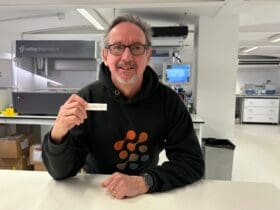A new educational toolkit designed to help dental teams prevent and identify mouth cancer has been launched by Health Education and Improvement Wales (HEIW).
Mouth cancer, which can affect the lips, tongue, cheeks and throat, affects approximately 8000 patients a year in the UK and is the eleventh most common cancer worldwide.
However, survival rates for patients are greatly improved if the cancers are diagnosed early and treated rapidly.
Dental teams are well placed to identify any abnormalities and play an important role in detecting cancers early during routine check-up appointments.
Kirstie Moons, Associate Director for Dental Team Workforce Planning and Development at HEIW, said: “While there have been great advances in the treatment of mouth cancer in recent years, the overall five-year survival rate post treatment remains at only 50%.
“Early detection and prompt action from dental teams can genuinely mean the difference between life and death for patients.
“Our Mouth Cancer Quality Improvement Tool will help dental teams feel confident in providing preventative advice, diagnosing mouth cancers early and in supporting patients who have the disease.”
HEIW’s new toolkit, which has been developed in collaboration with dental teams at Public Health Wales and Cardiff University, can be used by all members of the dental practice team – including dentists, dental nurses, hygienists and technicians – to ensure an effective whole team approach to patient care.
The resource supports dental teams to: raise patient awareness of the causes of mouth cancer (including tobacco and alcohol use and the transmitting of the Human Papilloma Virus (HPV)), help patients become more aware of the symptoms, be confident in how to discuss suspected cancer with patients and to be aware of available training and resources on the early detection of mouth cancer.
Natalie Rees, a dental care professional involved in the pilot of the toolkit at Gwaun Cae Gurwen dental practice in Ammanford, said: “Having recently seen a patient with mouth cancer, it [the toolkit] allowed me to be confident in our practice processes.”
David Ainsworth, a dentist at the same practice added: “It is a very useful tool and has led to thoughtful discussion on our processes and roles.”








Leave a Reply
View Comments